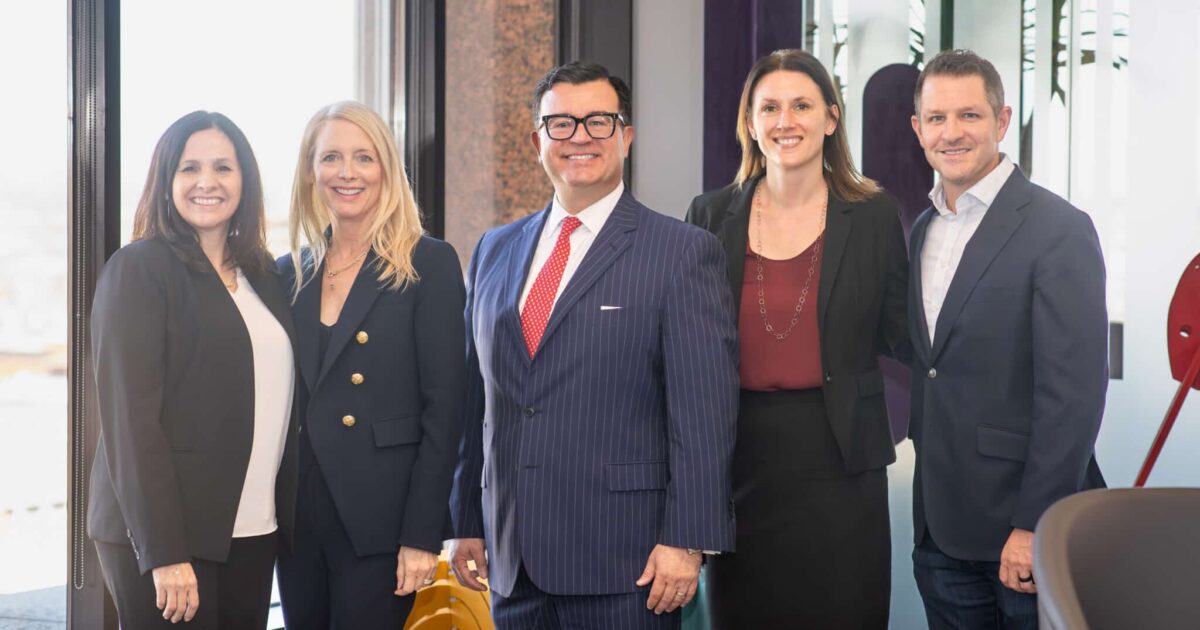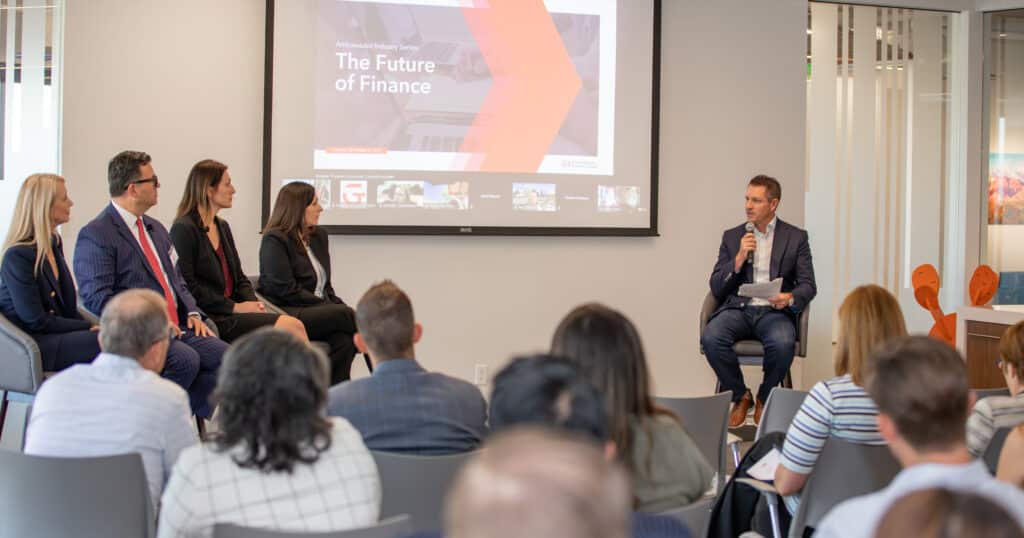

Ambassador Event: The Future of Finance
Published: 10/01/2024
Industry experts explored the keys to growth and future success of the finance sector
Greater Phoenix stands as a competitive market in the finance and insurance industry with a favorable business climate, strategic location and skilled workforce, which together have attracted numerous financial companies, institutions and opportunities for fintech innovation.
GPEC, with the help of a roundtable of regional finance experts, built a six-page industry report based on the conversation and up-to-date regional data. On Sept. 24, GPEC hosted its second Industry Series event focused on the future of finance in Greater Phoenix featuring a moderated panel discussion. The panel included:
- Megan Ackaert, Arizona Market Executive, Wells Fargo
- Mary Fedewa, President & CEO, STORE Capital
- Xavier Gutierrez, Chairman, CEO & Co-Founder, ImpactX Sports Group
- Valerie Jones, Consultant, SVP, HR Talent Acquisition Executive, Bank of America & Workforce Development Consultant for Maricopa County Community College District
- Chris Camacho, President & CEO, GPEC (moderator)
Building Greater Phoenix’s finance ecosystem
The region is home to a dynamic finance cluster consisting of operations ranging from fintech to bank branches and nerve centers, making up 8.6% of the regional gross domestic product. Additionally, the market boasts a strong base of more than 94,000 finance professionals, thanks to a system of university programs that feed into an ecosystem that includes seven major finance companies with a sizable presence. Arizona also has nearly 260,000 FINRA licensed representatives, the sixth-most among all U.S. states.
The state’s pro-business policies with favorable taxes and operating costs make it an attractive destination for financial services firms. In addition, the region’s burgeoning technology sector, particularly in fintech, has created synergies and opportunities for financial innovation. This includes a fintech regulatory sandbox, allowing companies in or out of Arizona to test innovative financial projects and services in a limited environment without needing to obtain all authorizations typically required.
Read more from The Future of Finance Industry Report
In the 1980s and 1990s, firms nationwide began decentralizing and relocating business services to markets across the country that offered low-cost land and labor. Greater Phoenix emerged as one of these markets, and these operations have since evolved in the region and become more technologically sophisticated.
Even after the significant centralization that occurred to financial services after the Great Recession between 2012 and 2020, Greater Phoenix emerged as a prime location for leading tech and finance companies, especially when the pandemic fundamentally changed how employers and employees viewed work from home versus in-office work.
Fedewa shared that this trend is becoming more pronounced as Arizona attracts an increasing number of manufacturing developments, both international and domestic, as well as experiential retail. “The footprint of office is very different than the retail building,” Fedewa added. “From an office-based perspective, I think that some will come back to the office, but the demand will be less. What we’re lucky for in Arizona is that we live in a great place … Some of our clients spent a year here in Arizona and after they came back, they said to us, ‘Oh my God, this is the best place!’”
Strategies for future growth: Maintaining an attractive business and lifestyle environment
GPEC’s Future of Finance report identifies three key strategies to drive future industry growth and success, one of which is to formulate intentional measures to continue attracting leading employers and employees. The region is well positioned with competitive cost benefits, quality of life and access to nearby markets.
“This should be the next finance center in America,” said Gutierrez. “When you think about the opportunity that this community has relative to Austin, to Denver, to Salt Lake City, and just as this state has done a great job in becoming the semiconductor hub in the world, there’s no reason why it shouldn’t be a finance center. I fundamentally believe that … this is the next great industrial policy opportunity for this community. This is where young people should have their finance careers,” Gutierrez added.
Heightened in-migration during the COVID-19 pandemic and small-but-sophisticated business leaders from Canadian investment firms or public pension funds who spend winters in Arizona have caused ripple effects on the community. Gutierrez indicated the maintenance of and investment in public infrastructure, libraries, parks, schools and other lifestyle considerations will increase the attraction of employers and employees in sectors like finance.
The panelists also evaluated how peer market policies play into workforce retention. Ackaert, who spent time in Seattle with Wells Fargo, said the Washington city generated wealth and private equity, but struggled with retention in part due to taxes. “I think the state’s tax policies on a lot of things have made it really tough for people to want to continue to grow businesses there, so they’re leaving,” Ackaert said. “One of the beneficiaries of that is Arizona and the more people that have those types of [financial] roles that come here and live here, the more it’s just going to expand.”
Greater Phoenix can become a prime location for financial front office and attracting employers from other markets should be the next phase of the strategic plan to bolster economic growth in the region through stable, high-paying jobs.
Aligning the industry and education
Another key to future success is the need for regional education leaders to strategize and collaborate with companies and location economic development organizations to ensure a steady supply of skilled finance professionals in the region. “Relationships are very important to turn this into reality,” Camacho said.
One measure that expanded the industry’s talent occurred was when FINRA, the self-regulatory organization that regulates member brokerage firms, changed the structure of the qualifications exams for finance professionals in 2018.
“FINRA split up the [Series] Six and the [Series] Seven and they got all the common information and put it into one exam called the Security Industry Essentials (SIE),” Jones shared. “When FINRA made that split, they no longer required an employer to sponsor these opportunities. So, what it did is it opened the market up to where people from community colleges, universities, private instruction, organizations … can get the SIE. In this way, more people can become qualified professionals and have these licenses.” Jones, who is consulting the Maricopa County Community Colleges District (MCCCD) on workforce development, said the number of FINRA representatives in the state grew 25% in the first five years after this change. “To keep education affordable, we have to continue to fund the community colleges … we have to support the community colleges, because we can’t assume that they have the resources to do all the great workforce development that they do, [and] they can’t do it without industry,” she said.
The SIE program, offered through MCCCD, is open to anyone 18 and older including students and candidates who need to demonstrate basic industry knowledge to potential employers. “With just three months and a $600 investment in Scottsdale Community College, you can walk into a $50,000 job,” Jones said. “The need is immense … We are looking to expand to other schools to help meet the demand that exists. This is a pretty niche job, but the opportunity and potential are vast.”
Supporting talent in accessing affordable, top-notch qualifications could reaffirm the decision of young professionals to relocate to Arizona. “From our last recruiting and internship cycle, we had a lot of interest in Arizona as a top choice. I think something is working, and it is exciting because we will be bringing great talent from other places within the country,” said Ackaert.
Enhancing the regulatory framework
Greater Phoenix has the opportunity to grow its regulatory framework and attract new companies through marketing and awareness, the third key highlighted in the GPEC report. The region is already fostering innovation in the financial sector through initiatives such as fintech accelerators and incubators. To attract firms that represent different financial services, including investment management firms, the region could further evaluate tax and regulatory policy. “This needs to be the next great investment management place, especially when you think about the opportunity for climate resilient infrastructure, real assets and real estate,” Gutierrez said.
The region’s fintech regulatory sandbox should be evaluated and compared to other markets so it remains an attractive tool. Furthermore, as opportunities for small businesses increase, investing in them through funds such as SBICs is crucial. “Having those SBIC funds here at a bigger scale would absolutely be an opportunity that gets you into that investment management community growth strategy,” Gutierrez argued.
“Small business lending continues to thrive,” Ackaert said. “There is abundance of lenders that will finance small businesses in this market. Investors are ready to support. From a large bank perspective, there is a lot of energy around helping these small businesses with their working capital.”
Looking forward for finance
Greater Phoenix’s desirable lifestyle, including more than 300 days of sunshine each year, outdoor activities, and a diverse arts and culture scene serves as a magnet for top talent. To remain at the competitive forefront of the finance industry, the region needs to not only support workforce partnerships and opportunities in education and innovation, but also adapt to big technological and environmental changes.
“The future is data-driven,” Fedewa said. The amount of data in the industry makes predictive models for portfolio management, real estate and prospects crucial. “This will provide more interesting jobs … so we can attract the most amazing talent here.” she added.
Climate change also plays a pivotal role in the region’s economic and overall growth. “Climate overall is a trend that permeates every industry. This makes Arizona uniquely positioned,” Gutierrez said. “Some of the largest private equities in the world talk about climate resiliency, and what better market than Arizona to explore the impact of climate in whatever industry you’re at including the livability of your talent and of your workforce.”
As the region continues on its unprecedented growth trajectory, finance industry leaders are focused on strategic planning and partnerships to enhance the market’s position and continue to attract high-value companies and talent.
Watch this space for GPEC’s monthly Industry Series event recaps and learn about eight key sectors shaping the region.
Meet the Panel
Megan Ackaert
Arizona & Nevada Market Executive
Wells Fargo
Mary Fedewa
President, CEO and Director
STORE Capital
Xavier A. Gutierrez
Chairman & CEO
ImpactX Sports Group, LLC.
Valerie Jones
Senior Vice President, HR Talent Acquisition Executive / Bank of America
Workforce Development Consultant / Maricopa County Community College District
Chris Camacho (Moderator)
President & CEO
GPEC





